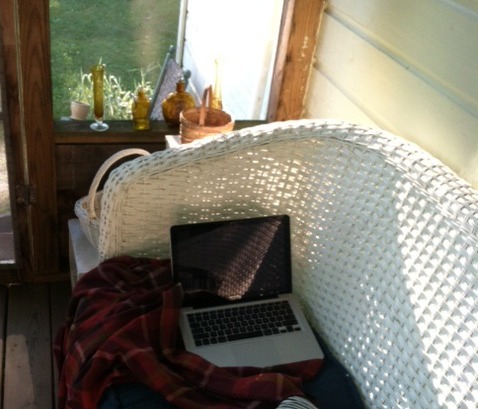As Books Editor, I’ve explored the work of other writers, but now I’m changing it up a bit — exploring my own.
Tayari Jones, my Spelman sister and good friend, invited me to participate in this blog tour. Writers get a chance to talk about the process of writing by answering four specific questions. Any excuse to talk about what we do, right?
Question #1: What are you working on?
Right now, I’m adding the final touches to my new novel, Into The Go-Slow, before it heads off to print in two weeks. Feminist Press releases it on September 11th — in exactly 3 months! — and I’m thrilled and pleased and grateful all at once.
Question #2: How does your work differ from others’ work in the same genre?
Defining my genre is tough….My work does tend to focus on self-discovery. Is that a genre? How it’s different from other writers’ work is how I’m different — an African-American woman born in the ’60s, raised in Detroit, within a working-class household, hungry to see the world — or at least a bigger piece of it. I write from the perspective of someone forever adjusting her sense of self in relation to others — and to the loss of others. I’m fascinated by how the loss of a sibling forces you to reshape your own understanding of who you are, in the space left behind. The main character in my novel, Angie, travels all the way to Nigeria from Detroit in the wake of her big sister’s death. Who is she without her sister Ella to define herself against? Finding the answer is her journey of self-discovery.
Question #3: Why do you write the stories that you do?
I write the stories I write because they are about African American men and women revealing the complexity of who they are without apology. That’s what I care about, that’s what fascinates me.
Beyond subject matter, why do I write? I write to create order in a random universe. I write to make sense of my own lived experiences. I write to force myself into emotional places I’d never otherwise go. I write to find connective threads too easily ignored in the day-to-day. I write to immortalize loved ones. I write to create a record of lives lived. I write to remember. I write in order to pay attention.
Question # 4: How does your writing process work?
My writing process is both slow and fast. It’s slow in the time it takes for me to complete a project. Case in point: Into The Go-Slow took nine years to write; my first novel took seven. My film took five years to write and produce. Yet, I wrote several drafts of each of those works. I rewrite a lot. I produce hundreds of pages. I take notes, I make rough-and-tumble outlines, I create detailed timelines. I do character bios. And I try different approaches to the same story. For Go-Slow, I wrote three versions of the novel — each from a different POV — before I discovered the one that said what I wanted it to say.
I have two kids, so that slows down the writing process for sure. My key over the years has been to get up early so I can write for at least an hour, maybe even two, before anyone else is up. That quiet morning time is my most creative and productive. Golden really. Honestly, I’ve had many days when I only get 20 or 30 minutes to write undisturbed. Doesn’t matter. The key for me is showing up to the work regularly, for however long, cup of coffee nearby. I’ve come to accept that the work takes the time that it takes.
That’s my process. Here’s what Tayari Jones had to say, in her wonderfully profound and witty way.
I selected two of my favorite writers for the blog tour next Monday, 6/16:
Eisa Nefertari Ulen is the author of the fabulous debut novel Crystelle Mourning and is currently working on a moving family saga that takes us from slavery to present-day. You can follow her on Twitter: @EisaUlen.
Tonya Hegamin’s beautiful new YA novel set during slavery, Willow, is out now — and it’s a must-read: Evocative, gripping and empowering, with a young African American heroine at its center. Buy several copies for the tweens and teens in your life, and an extra copy for yourself.

